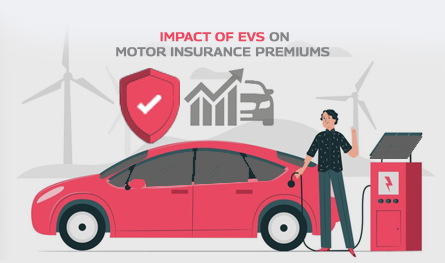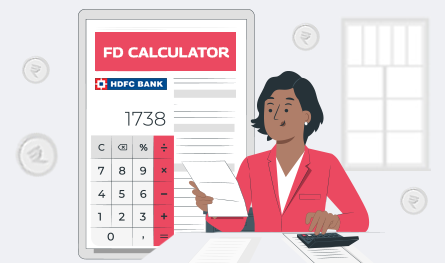The Impact of EVs on Motor Insurance Premiums

So, you have been eyeing that sleek new electric car. It is silent, futuristic, and easier on the environment – and let’s not forget the thrill of skipping fuel stations. But before you make that eco- friendly shift to EVs, there is one often-overlooked detail you need to consider: EV motor insurance.You need to understand how switching to an EV could affect your motor insurance premium.

Here’s the truth - EV motor insurance does not play by exactly the same rules as your old petrol or diesel friend. From how premiums are calculated to the unique add-ons tailored for electric vehicles, there’s a new playbook you’ll want to get familiar with. With that in mind, let’s deep dive into the world of electric vehicle insurance and how it could impact your wallet.
Why Does Electric Vehicle Insurance Work Differently?
As technology is evolving, we are stepping into a new world of vehicles. Unlike traditional petrol or diesel vehicles that our fathers used to drive, the new generation of EVs runs on lithium-ion batteries and highly specialised tech. While this sounds good and futuristic, it also means that repairing an electric vehicle, replacing parts, or even diagnosing small issues can be more expensive and slower than for your average car or bike.
Now, insurance providers are not blind to this fact. As the government is pushing towards electric vehicles and a more sustainable environment, insurers are paying extra attention to EVs and how the industry is evolving. They are coming up with new EV motor insurance policies every now and then. Your insurance premium will depend on factors like:
- Specialised parts and diagnostic tools
- Battery replacement cost
- The overall market value of the EV
- Driving history
- Usage pattern
To be concise, your insurance is not just based on what you drive – it is based on how “insurable” that specific vehicle is in today’s world and your usage history as a driver.
Is EV Motor Insurance Cheaper or More Expensive?
Here’s where things get a bit tricky. Let’s break it down for you:
1. Higher Repair Costs = Higher Insurance Premiums
Yes, electric vehicles can be pricier, and repairs of these vehicles often require specialised knowledge. A small issue in an EV might mean a series of sensor recalibrations and battery safety checks – things that are not cheap. This usually means a higher rate of premium for you.
2. There are Discounts
Many insurance providers offer discounted rates on EV motor insurance premiums to help you make the shift effortlessly. So, while the base premium may be slightly higher, the final price could be equal to or even lower than what you would pay for a traditional petrol car.
3. Add-ons Are Key
You will want to consider EV-specific add-ons like battery protection, roadside EV charging assistance, and electrical system coverage. These will bump up your premium a bit, but it’s better to have them in times of emergency.
4. Lower Depreciation Rates Help
Electric vehicles tend to hold their value much better than old traditional models. That’s some good news for you and your insurance premiums. The slower your vehicle depreciates, the better your coverage-to-cost ratio gets.
How to Keep Your EV Motor Insurance Premium in Check?
You do not have to accept a sky-high insurance premium just because your car is electric. With a little effort, you can keep your motor insurance premium in check. Here’s how:
1. Choose the Right IDV
Don’t blindly accept the IDV that your insurance provider suggests. Go for a realistic value that balances premium costs and your claim eligibility.
2. Install Anti-Theft Device
EVs are attractive targets, especially the newer models. Installing an ARAI-approved anti-theft system can fetch you a nice little discount on your premium.
3. Opt for a Higher Voluntary Deductible
If you are confident in your driving skills, opting for a higher deductible can reduce your premium rate. Just make sure you can cover that amount in case of emergencies.
4. Clean Driving History
Some insurers offer telematics-based insurance coverage. They track how you drive and reward good driving behaviour with lower premiums. Think of it as karma for careful drivers.
5. Use No-Claim Bonus
Insurance providers reward you with discounts if you don’t file claims on your insurance plan for a year. Use this to your advantage to keep your premiums low.
6. Pay-as-you-drive Insurance
This type of motor insurance plan charges you a premium based on the number of kilometres you have driven your insured vehicle. If you are someone who does not drive that often, this can help you lower your premium to an extent.

Author Bio
Paybima Team
Paybima is an Indian insurance aggregator on a mission to make insurance simple for people. Paybima is the Digital arm of the already established and trusted Mahindra Insurance Brokers Ltd., a reputed name in the insurance broking industry with 17 years of experience. Paybima promises you the easy-to-access online platform to buy insurance policies, and also extend their unrelented assistance with all your policy related queries and services.
Other Motor Insurance Products
Latest Post
.png)
You've sorted the nursery. The list of baby names is getting longer and longer. And at 2:00 a.m., you're excitedly reading online reviews about a baby stroller. Well, that's how excited usually parents-to-be are. But amidst all the planning and excitement, here is the question that individuals may sometimes overlook: Will your health insurance cover all this?

.png)
Buying health insurance feels like preparing for a first date. You dress up your health history, try to appear as fit as possible, and hope there are no awkward questions coming your way. But what if you could skip the whole awkward health screening part altogether?
Many insurance companies now offer health insurance plans that do not require you to take any medical test. Sounds tempting, right? No needles. No numbers. No judgmental doctors asking if you really do workout five times a week. But as with anything that sounds easy in insurance, there is more to the story.
So, let’s break it down for you. Can you actually skip the medical test and still get decent health insurance? What are the pros, the cons, and the not-so-obvious consequences? Let’s deep dive and find out.

The last few years have made it very clear that having health insurance is essential for everyone. Whether you are a young professional or a senior citizen, are single or have a family to support, health insurance cannot be ignored. Keeping this in mind, health insurance companies offer comprehensive plans that suit people with varied insurance needs.


Fixed Deposits (FDs) are one of the safest ways to grow your savings. HDFC Bank offers attractive FD interest rates, allowing you to earn guaranteed returns on your investment. But before you invest, it's important to know how much interest you will earn and what your final maturity amount will be.


If you think of life insurance, chances are you are picturing something people buy in their 30s or 40s. But what if you are 65 or older and just getting started? The good news is that you are never too late. Whether you are thinking of easing the financial burden on your family, covering final expenses, or simply leaving behind a legacy, there are life insurance options tailored just for you.
This article will be a guide to life insurance for senior citizens above 65 years, explaining why it is important, the type of insurance options, and how to get the right policy for you.




